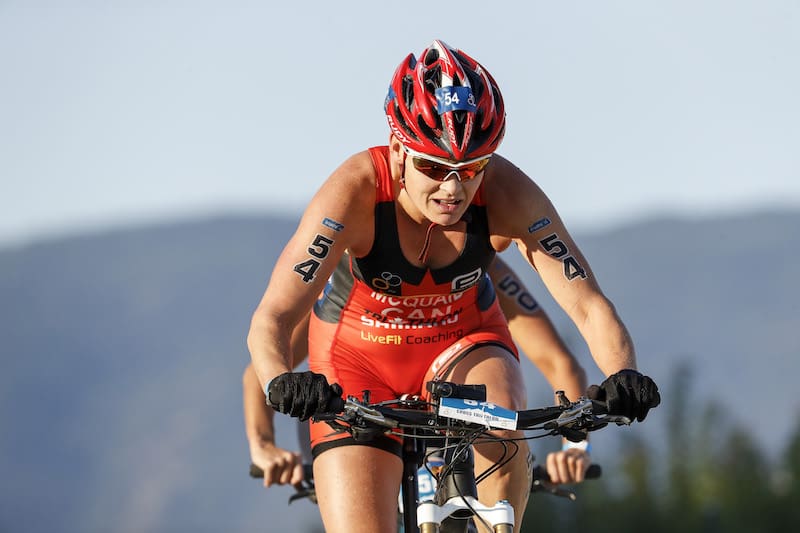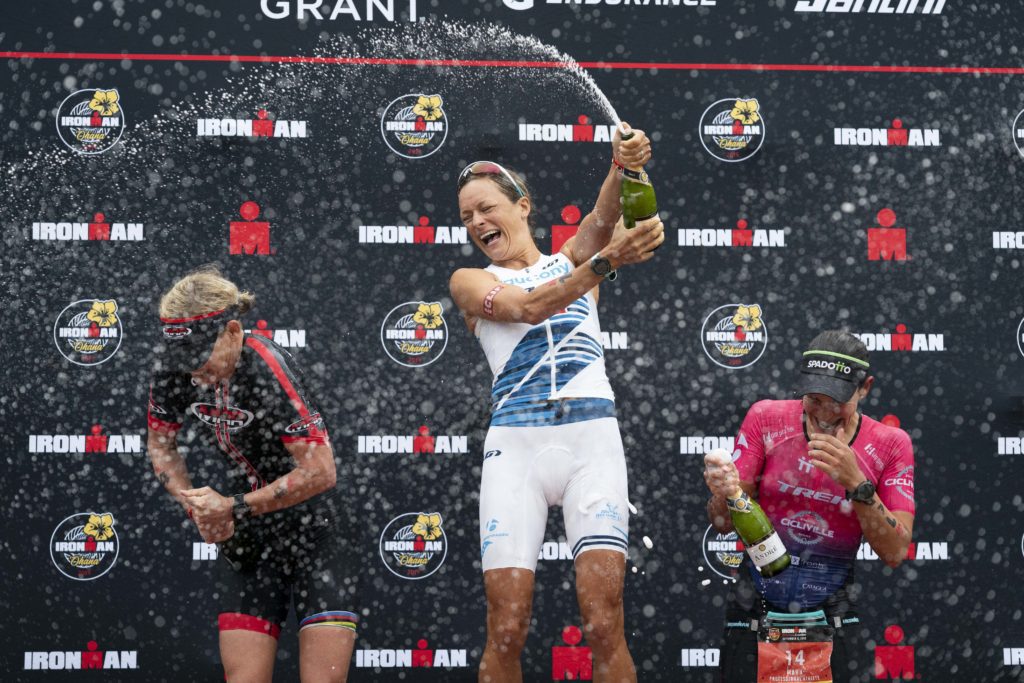Melanie McQuaid wonderful in Wisconsin


Last weekend Melanie McQuaid bounced back from a tough day at Ironman Canada with a runner-up finish to Linsey Corbin at Ironman Wisconsin in Madison. We caught up with McQuaid after her big race:
Triathlon Magazine Canada: Congrats on the great race in Wisconsin. Were you surprised with the result or did you feel like you were ready for that kind of a day?
Melanie McQuaid: I raced what I knew I was capable of. It wasn’t perfect. I faded a bit on the bike due to caloric deficit, and similarly faded in the last seven km of the run due to a marathon being a longass way, but it wasn’t a surprise. I knew what I could do. Now, of course, I am ready to go faster.

You had to overcome some injuries earlier this year – what was the key to working through those to get race-ready?
The main goal every year is to string together as much consistency as possible. I did a ton of consistent strength training this year and pushed my block of lower intensity stuff pretty far into the race calendar. I found that left me a bit slow at the start of the year. Luckily, a slow start probably means I might have another race left this year because I am not sure I maxed the fitness yet.
You raced Whistler earlier this summer – what was the goal for that event? Was it a build up to the race in Wisconsin?
Whistler was my actual main goal for the season, but I totally blew it in the taper, nutrition and mental prep for that race. It was all around a disappointing result for me. Luckily the nine athletes on my MelRad squad killed it in every way, so it was still a season highlight for me, but personally, I needed a mulligan race after that.
You came second at your Ironman debut in Whistler in 2015, then did Ironman Arizona and then seemed to take a break from full-distance for a bit. What brought you back to long-distance racing?
I actually had a forced break. I dislocated my left foot and broke my tibia, fibula and lateral malleolus in 2016. It is called a trimalleolar fracture with dislocation and is a questionable return to running injury. Two surgeries and more than three years later I am confident in that leg, but it still is more “cankly” than my right side.
It has been a humbling process coming back from that injury, but now that I am through it I am actually grateful for what I have learned. I truly thought I would be back within four months, but the first race I saw a glimmer of my previous ability in Ironman racing was the past 2019 IM 70.3 Coeur D’Alene this year, where I finally was competitive at the top level in Ironman. (I was fourth and everyone in the top six, other than me, had won a race in 2019).
I was back to riding well in 2017 when I won the ITU Cross Worlds title, but my running was still super dodgy, so I was lucky that race was eight km of running. I couldn’t crack a 90-minute half in Ironman races in 2016, 2017, 2018 and the start of 2019. It was rough and frustrating. However, three years of showing up to races and getting demolished has been good for building some resilience, persistence and commitment, but having some results this season was my first dose of real confidence. Without the Couer D’Alene race, I probably would not have bounced back from the mess I made of Whistler. I am so happy I did, but it is pretty crazy how stubborn I am to carry on for so long getting my butt kicked still thinking I could be competitive.
You’re best-known for all your world titles as a cross racer. Which style of racing do you prefer? Will you be doing any cross stuff in the future?
I am going to go back to Maui this year because I coach athletes in off road triathlon, but, for me personally, I have accomplished everything I could ever want in offroad triathlon. Winning another world title in the sport at the ITU Multisport World Championships in Penticton in 2017 was the cherry on top of my offroad career. Now both my coaching and athletic frontier is pushed by Ironman. There is a lot I can still learn about everything but the long distance stuff really challenges and excites me now. As long as I am still competitive as a pro I will continue to race, because I feel like the racing accelerates my professional development as a coach.
Not sure how to put this, but I’ll go for it: You turned 46 this year. How exciting is it for you to be racing at this level into your 40s? What’s the key to your longevity in the sport, do you think?
It is funny how this is such a delicate subject. I have decided it is best to absolutely own it. I want to be one of the professional female athletes who refused to be pushed out of the sport by sponsors not finding marketing value because I have reached a “certain age.” This doesn’t really happen as much to male pros. I also want to show other female athletes that you don’t need to shy away from, apologize, or even rationalize having serious athletic goals after you turn 40. If your body is letting you still train the crap out of yourself, you should 100 percent go for it and make no apologies for it. There is a bit of noise and resistance when you get a bit older that I definitely have struggled with, but now that some of the things I thought I could accomplish are actually happening, I have now decided to turn the noise right off. I just look at what I think is possible and get after it. Expectations of others are not my responsibility. I just work with where I am now, what I think I can do, and kind of forge a path as a relative Ironman newbie in my 40s.
You’re busy with so many other things in addition to training – coaching, writing, etc. How do you balance it all?
There is no such thing as balance. I used to think I was “balanced” in my 30s. That is rubbish. You just put fires out as you prioritize. I do think I am not as bloodthirsty about winning as I was in my younger years, so I wouldn’t be willing to make my partner, my dog and the athletes I work with unhappy by tipping the balance to 100 percent me. It is actually better for me to have other stuff in my life so I can get over myself. At the end of the day everything I do in the sport now is icing on a cake so I am a bit more relaxed about it all. I don’t know if that is obvious when I show up for training sessions though… I try to make the most of the time I have allotted to training. I think that is what I try to instill in athletes I coach… you can have other stuff, but make the time you spend training time well spent. You get more out of consistent mindful sessions than you will out of more time spent half assed.
